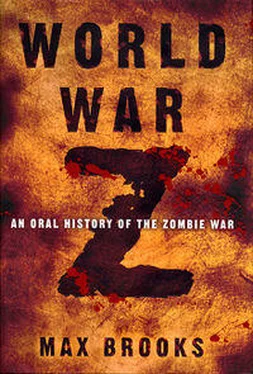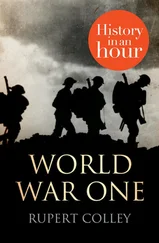We had some advantages. California’s agricultural base could at least erase the problem of starvation, if it could be restructured. The citrus growers didn’t go quietly, neither did the ranchers. The beef barons who controlled so much prime potential farmland were the worst. Did you ever hear of Don Hill? Ever see the movie Roy Elliot did on him? It was when the infestation hit the San Joaquin Valley, the dead swarming over his fences, attacking his cattle, tearing them apart like African driver ants. And there he was in the middle of it all, shooting and hollering like Gregory Peck in Duel in the Sun. I dealt with him openly and honestly. As with everyone else, I gave him the choice. I reminded him that winter was coming and there were still a lot of very hungry people out there. I warned him that when the hordes of starving refugees showed up to finish what the living dead started, he’d have no government protection whatsoever. Hill was a brave, stubborn bastard, but he wasn’t an idiot. He agreed to surrender his land and herd only on the condition that his and everyone else’s breeding stock remained untouched. We shook on that.
Tender, juicy steaks-can you think of a better icon of our prewar artificial standard of living’ And yet it was that standard that ended up being our second great advantage. The only way to supplement our resource base was recycling. This was nothing new. The Israelis had started when they sealed their borders and since then each nation had adopted it to one degree or another. None of their stockpiles, however, could even compare to what we had at our disposal. Think about what life was like in the prewar America. Even those considered middle class enjoyed, or took for granted, a level of material comfort unheard of by any other nation at any other time in human history. The clothing, the kitchenware, the electronics, the automobiles, just in the Los Angeles basin alone, outnumbered the prewar population by three to one. The cars poured in by the millions, every house, every neighborhood. We had an entire industry of over a hundred thousand employees working three shifts, seven days a week: collecting, cataloging, disassembling, storing, and shipping parts and pieces to factories all over the coast. There was a little trouble, like with the cattle ranchers, people not wanting to turn over their Hummers or vintage Italian midlife crisis mobiles. Funny, no gas to run them but they still hung on anyway. It didn’t bother me too much. They were a pleasure to deal with compared to the military establishment.
Of all my adversaries, easily the most tenacious were the ones in uniform. I never had direct control over any of their R D, they were free to green light whatever they wanted. But given that almost all their programs were farmed out to civilian contractors and that those contractors depended on resources controlled by DeStRes, I had de facto control. “You cannot mothball our Stealth bombers,” they would yell. “Who the Blank do you think you are to cancel our production of tanks?” At first I tried to reason with them: “The M-l Abrams has a jet engine. Where are you going to find that kind of fuel ? Why do you need Stealth aircraft against an enemy that doesn’t have radar?” I tried to make them see that given what we had to work with, as opposed to what we were facing, we simply had to get the largest return on our investment or, in their language, the most bang for our buck. They were insufferable, with their all-hours phone calls, or just showing up at my office unannounced. I guess I can’t really blame them, not after how we all treated them after the last brushfire war, and certainly not after almost having their asses handed to them at Yonkers. They were teetering on the edge of total collapse, and a lot of them just needed somewhere to vent.
[He grins confidently.]
I started my career trading on the floor of the NYSE, so I can yell as hard and long as any professional drill sergeant. After each “meeting,” I’d expect the call, the one Pd been both dreading and hoping for: “Mister Sinclair, this is the president, I just want to thank you for your service and we’ll no longer be requiring…” [Chuckles.] It never came. My guess is no one else wanted the job.
[His smile fades.]
I’m not saying that I didn’t make mistakes. I know I was too anal about the air force’s D-Corps. I didn’t understand their safety protocols or what dirigibles could really accomplish in undead warfare. All I knew was that with our negligible helium supply, the only cost-effective lift gas was hydrogen and no way was I going to waste lives and resources on a fleet of modern day Hindenburgs. I also had to be persuaded, by the president, no less, to reopen the experimental cold fusion project at Livermore. He argued that even though a breakthrough was, at best, still decades away, “planning for the future lets our people know there will be one.” I was too conservative with some projects, and with others I was far too liberal.
Project Yellow Jacket-I still kick myself when I think about that one. These Silicon Valley eggheads, all of them geniuses in their own field, convinced me that they had a “wonder weapon” that could win the war, theoretically, within forty-eight hours of deployment. They could build micro missiles, millions of them, about the size of a .22 rimfire bullet, that could be scattered from transport aircraft, then guided by satellites to the brain of every zombie in North America. Sounds amazing, right? It did to me.
[He grumbles to himself.]
When I think of what we poured down that hole, what we could have produced instead… ahhh… no point in dwelling on it now.
I could have gone head-to-head against the military for the duration of the war, but I’m grateful, in the end, that I didn’t have to. When Travis D’Ambrosia became chairman of the Joint Chiefs, he not only invented the resource-to-kill ratio, but developed a comprehensive strategy to employ it. I always listened to him when he told me a certain weapons system was vital. I trusted his opinion in matters like the new Battle Dress Uniform or the Standard Infantry Rifle.
What was so amazing to see was how the culture of RKR began to take hold among the rank and file. You’d hear soldiers talking on the street, in bars, on the train; “Why have X, when for the same price you could have ten Ys, which could kill a hundred times as many Zs.” Soldiers even began coming up with ideas on their own, inventing more cost-effective tools than we could have envisioned. I think they enjoyed it-improvising, adapting, outthinking us bureaucrats. The marines surprised me the most. I’d always bought into the myth of the stupid jarhead, the knuckle-dragging, locked-jaw, testosterone-driven Neanderthal. I never knew that because the Corps always has to procure its assets through the navy, and because admirals are never going to get too fired up about land warfare, that improvisation has had to be one of their most treasured virtues.
[Sinclair points above my head to the opposite wall. On it hangs a heavy steel rod ending in what looks like a fusion of shovel and double-bladed battle-axe. Its official designation is the Standard Infantry Entrenchment Tool, although, to most, it is known as either the “Lobotomizer,” or simply, the “Lobo.”]
The leathernecks came up with that one, using nothing but the steel of recycled cars. We made twenty-three million during the war.
[He smiles with pride.]
And they’re still making them today.
[Winter has come later this season, as it has every year since the end of the war. Snow blankets the house and surrounding farmland and frosts the trees that shade the dirt track by the river. Everything about this scene is peaceful, except for the man with me. He insists on calling himself “the Whacko,” because “everyone else calls me that, why shouldn’t you?” His stride is fast and purposeful, the cane given to him by his doctor land wife serves only to stab at the air.]
Читать дальше












